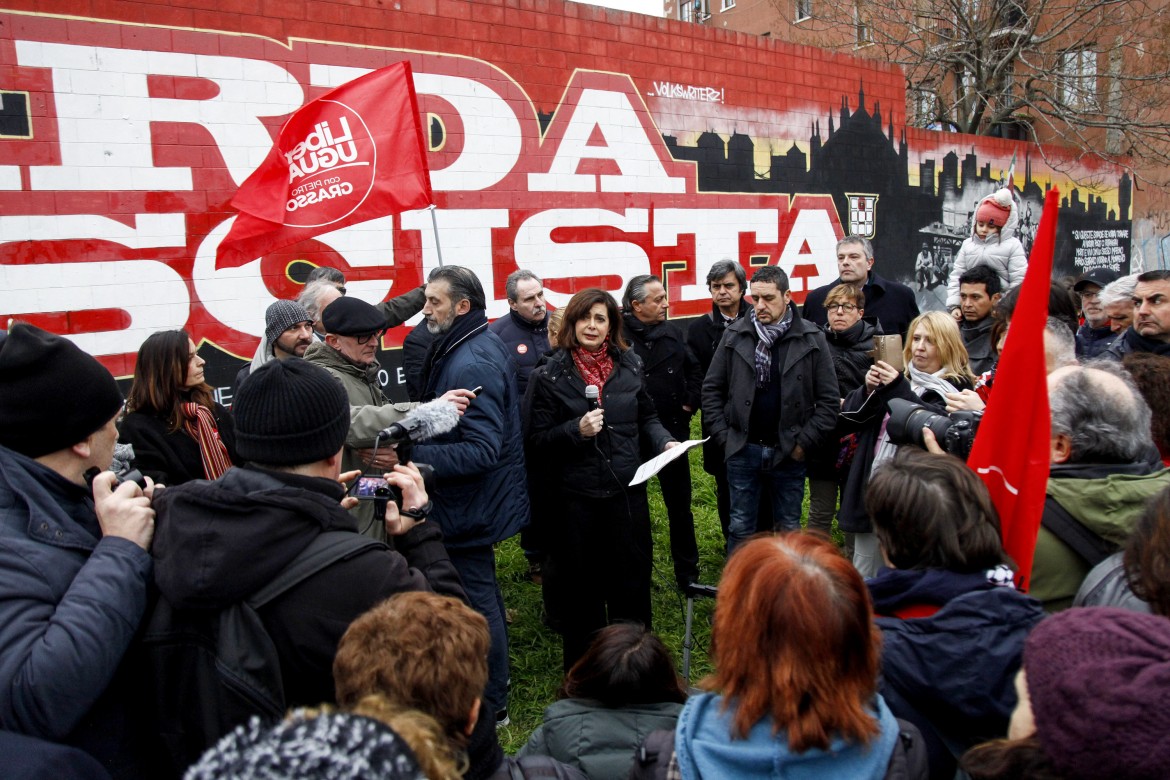Analysis
Italy debates what to do about its neo-Nazi problem
The leader of Italy’s lower house called for dissolving fascist political parties. Even if that were legal, it may not be such a good idea.

Should we—and could we—“dissolve the groups that are inspired by fascism,” as Laura Boldrini, president of the Italian Chamber of Deputies, called for on Sunday while speaking before an anti-fascist mural in the Niguarda neighborhood of Milan?
Boldrini has long supported a number of initiatives by which the National Association of Italian Partisans (ANPI) is trying to draw attention to the mounting risks of neo-Fascism. The proposal entitled Mai più fascismi (“Never again Fascisms!”), promoted by the ANPI, ARCI, ACLI, ANED, CGIL, CISL, Libera and other trade associations, calling for the dissolution of neofascist and neo-Nazi groups, has collected more than 60,000 online signatures and others more from street-level campaigns since the beginning of the year.
The Interior Minister Marco Minniti has been much more cautious, however, explaining in various settings—including in the halls of Parliament—that without a definitive conviction, one cannot proceed to dissolve such groups. Boldrini’s statement Sunday has been lauded almost exclusively by those associated with Liberi e Uguali, the electoral alliance for which Minniti is running for Deputy.
The president of the Senate, Pietro Grasso, the head of Liberi e Uguali, immediately expressed his support, as did the three leaders of the parties that make up the joint list: Speranza, Fratoianni and Civati. There was also some support coming from the Democratic Party, as Minister Fedeli said that “those who stand against our Constitution are outlaws,” while the left-wing Potere al Popolo accused Grasso and Boldrini of opportunistic “anti-fascism for electoral purposes”: “This is not a serious proposal,” concluded Maurizio Acerbo.
Meanwhile, an identical position was taken by the centrist former Berlusconi allies, whether they are again now supporting Berlusconi or whether they have chosen to side with Renzi: “Then we should also dissolve all the social centers,” remarked both Maurizio Lupi and Fabrizio Cicchitto (referring to the local community organizations that are known for their involvement in radical left-wing and antifascist politics). Salvini promised that he would, in fact, do it himself: “We’re going to lock up the social centers.”
But we don’t need to go all the way to Salvini and his all-too-obvious pandering to the extreme right: the tendency to equate the fascists and anti-fascists is now widespread. It has a lot to do with the reasoning that led the Interior Minister to try to ban the Feb. 10 anti-fascist march in Macerata. These days, from Bologna to Napoli, the police are committed above all to ensure that the manifestations by Forza Nuova and CasaPound occur without incidents (and one can read more about the methods they are using to this effect in today’s edition of our paper).
The ANPI and the other signatories of “Mai più fascismi” called out to Minniti in January to rule that neo-fascist organizations were ineligible to participate in the elections. The ministry, however, has instead followed the letter of the law, which bans symbols with direct or indirect references to fascism and Nazism, which both CasaPound and the Forza Nuova took care to avoid. The notable exception was in the case of the Fiamma Tricolore (which was, in the end, allowed to run), allied with the latter. One should note that these three organizations have participated undisturbed in the 2013 elections as well.
But it wasn’t a mere formal obstacle that has kept neo-fascist organizations from being dissolved for all these years, as would have been required both by the Constitution itself (Art. XII, final disposition) and by the Scelba Law (1952) and the Mancino Law (1993), nor was it, perhaps, an instance of Voltairean irony. It was rather the political consideration that it was preferable to avoid giving the mantle of persecuted to organizations that posed little danger as regards mass participation. Minniti, who in this matter is the heir of a tradition dating back to the times of the Italian Communist Party, seems to believe that this remains the best attitude to take, even faced with the recent strengthening of these organizations—and the increased level of danger they are posing.
In effect, the Scelba Law, and likewise the Mancino Law, provide for the dissolution of groups that are pursuing the reconstruction of the Fascist Party, but only after a criminal conviction to that effect, as it occurred in the ‘70s in the cases of the Ordine Nuovo and the Avanguardia Nazionale. The Mancino Law, however, also allows for the administrative suspension of such groups—a provision which it supports by referring back to the Anselmi Law against secret societies—in cases of proven violence or incitements to violence with racist aims. But “administrative suspension for the neo-fascist organizations!” just wouldn’t work as well as a slogan, particularly during an election campaign.
Originally published at https://ilmanifesto.it/boldrini-vuole-sciogliere-i-gruppi-neofascisti/ on 2018-02-20
